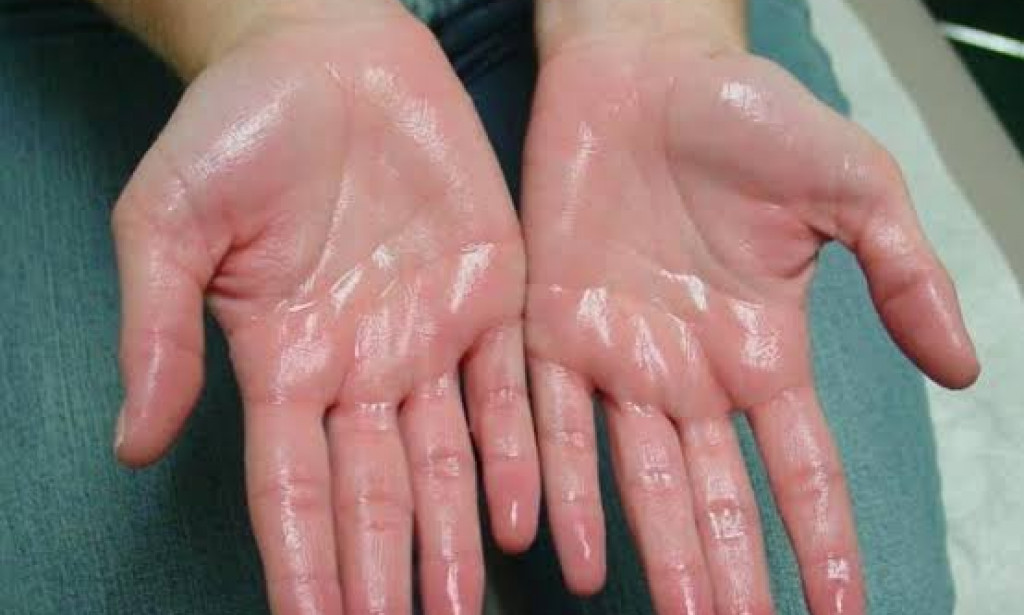Describe hyperhidrosis.
Hyperhidrosis is an increase in sweating in certain body regions as a consequence of an increase in sweat gland output.
This increased sweating is often produced by these glands being overactive as a result of neural hyperstimulation, emotional strain or stress, the action of pharmaceutical medications, or for thermal causes.
Even though the hypothalamus normally regulates body temperature, hyperhidrosis causes the sweat glands in the hands, feet, armpits, and craniofacial region to become particularly sensitive to emotional or thermal stimuli, causing more intense sweating to regulate temperature and counteract the rise in temperature.
Hyperhidrosis affects one percent of the population and can be socially and professionally disabling. half of cases, it is inherited.
Hyperhidrosis is the medical term for excessive and unpredictable sweating. Palmar hyperhidrosis is the name given to it when it affects the hands.
palmar overheating, What's the matter with you?
The body stays cool by sweating. If you feel hot, exercising, frightened, furious, ashamed, or terrified, it is a typical bodily reaction.
When you have hyperhidrosis, your sweat glands work more than usual due to inadequate control of their activity. Because of this, you may sweat excessively on command and without a specific reason. Additionally, you will perspire just like everyone else in stressful conditions.
Uncontrolled perspiration has the potential to cause emotional as well as physical pain, including cracks, sores, and infections. It may have a negative impact on your daily activities; you may feel agitated or uneasy in the presence of others; self-conscious about the humidity and fragrance; afraid to shake hands with people; wet on exams and unable to write; or humiliated in front of friends, your spouse, or at school. All of these things may result in social isolation, anxiety, or sadness.
What causes excessive sweating?
The reasons for excessive sweating that may need consulting a doctor include, in addition to the obvious ones like heat, activity, fever, high weather, anxiety, or consuming meals with a lot of heat, secondary to a physiological condition. The start of menopause, which is often accompanied by irregular menstrual cycles and hot flushes, is the most frequent reason. Excessive sweating may begin before menstrual abnormalities and frequently persists even after menstruation has stopped completely.second to taking some drugs. It ranks as the second most common reason for excessive perspiration. Different hormonal drugs used in women (and in males for the treatment of prostate cancer), aspirin usage, and anti-inflammatory medications are the most common medications that might produce excessive perspiration. There could also be increased perspiration after quitting alcohol or other drugs. In addition to certain illnesses, hyperthyroidism, hypoglycemia, carcinoid syndrome, and acromegaly are endocrinological conditions.
Parkinson's disease is neurological.
Infections like malaria and TB
Lymphomas and other types of blood malignancies are cancers.
Excessive sweating is often only one symptom among many others that are typically more significant in the majority of these conditions.Sweating that is primary or has an underlying cause (essential hyperhidrosis). Usually, it only affects the armpits, the bottoms of the feet, and the palms of the hands. This sort of perspiration is distinguished by the fact that it DOES NOT typically happen when you are sleeping at night. There are often additional family members who are dealing with the same issue.
Why do my hands always perspire?
In general, when we are stressed, afraid, or excited, our hands start to perspire. This occurs as a result of the larger concentration of eccrine sweat glands in our hands, forehead, and feet. They are associated with the sympathetic nervous system, which activates in response to stress or anxiety.
Some people who suffer from hyperhidrosis, or excessive sweating, only experience excessive hand sweating. It is known as "palmar hyperhidrosis." Although it may be present from birth, it often starts to happen around puberty. Hyperhidrosis may go away in some people, but in others, it may persist forever.
Your body may sometimes produce an excessive amount of insulin, the hormone that aids in the conversion of sugar into energy, when you have a high-sugar meal. Reactive hypoglycemia, a drop in blood sugar as a result, may result. One indication of this is sweating.
How to stop having sweaty palms
Here are some pointers to help you manage hand sweat:
-frequent hand washing. Water is enough unless they are unclean, since consistently using soap might result in dry skin.
-Always have disposable tissues available for hand drying throughout the day.
-When there isn't a restroom or sink nearby, hydroalcoholic gels may help you wash and dry your hands.
-If you want to know how to stop sweating on your hands, talc (powder) is great since it helps to absorb sweat and gives your hands more control while picking up items.
-Avoid wearing gloves unless it's really cold outside since they prevent sweat from evaporating, which increases its visibility.
-You may be interested in reading up on other stress-related remedies, as stress plays a significant role in issues with sweaty hands.
-People who have excessive hand sweating should be aware that there are a variety of therapies available for controlling hand sweat. Discuss your alternatives with your doctor to evaluate all of your possibilities.
-Avoid placing your hands in your pockets since they will sweat more because they are warmer.
-Avoid constantly blotting them dry since doing so will remind your brain that you perspire, which will encourage you to perspire more out of fear.
-Avoid meals and beverages that cause you to perspire more (caffeine, spicy foods, and alcohol).
-Engage in relaxation exercises and other activities that assist your nervous system in improving self-regulation.



You must be logged in to post a comment.